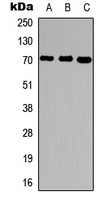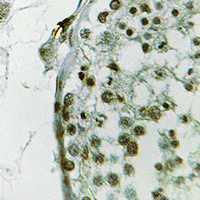

| WB | 咨询技术 | Human,Mouse,Rat |
| IF | 咨询技术 | Human,Mouse,Rat |
| IHC | 1/50-1/100 | Human,Mouse,Rat |
| ICC | 技术咨询 | Human,Mouse,Rat |
| FCM | 咨询技术 | Human,Mouse,Rat |
| Elisa | 咨询技术 | Human,Mouse,Rat |
| Aliases | Ubiquilin-3 |
| Entrez GeneID | 50613; |
| WB Predicted band size | 71kDa |
| Host/Isotype | Rabbit IgG |
| Antibody Type | Primary antibody |
| Storage | Store at 4°C short term. Aliquot and store at -20°C long term. Avoid freeze/thaw cycles. |
| Species Reactivity | Human,Rat |
| Immunogen | KLH-conjugated synthetic peptide encompassing a sequence within the center region of human Ubiquilin 3. |
| Formulation | Purified antibody in PBS with 0.05% sodium azide. |
+ +
以下是关于Ubiquilin 3(UBQLN3)抗体的3篇参考文献,涵盖其功能研究和应用方向:
---
1. **文献名称**: *Ubiquilin-3 regulates ER stress-induced apoptosis through the JNK signaling pathway*
**作者**: Lim PJ et al.
**摘要**: 该研究利用UBQLN3特异性抗体,通过免疫共沉淀和Western blot技术,揭示了UBQLN3在内质网应激诱导的细胞凋亡中的作用,发现其通过调控JNK信号通路影响凋亡相关蛋白(如caspase-3)的激活。
2. **文献名称**: *Ubiquilin proteins in neurodegenerative disorders: Focus on UBQLN3 in Huntington’s disease*
**作者**: Wang H et al.
**摘要**: 研究通过UBQLN3抗体检测亨廷顿病模型中的蛋白表达变化,发现UBQLN3与突变型亨廷顿蛋白(mHTT)存在相互作用,可能通过泛素-蛋白酶体系统调节异常蛋白的降解,为神经退行机制提供新见解。
3. **文献名称**: *Development and validation of a monoclonal antibody specific for human Ubiquilin-3*
**作者**: Kim S et al.
**摘要**: 该文献详细描述了一种针对人源UBQLN3的单克隆抗体的开发与验证过程,包括抗原设计(靶向C端结构域)、抗体特异性测试(通过敲除细胞系验证),并展示了其在免疫组化和流式细胞术中的应用效果。
---
**备注**:若需更早期研究或特定技术(如染色质免疫沉淀ChIP)相关文献,可进一步补充。
Ubiquilin 3 (UBQLN3) is a member of the ubiquitin-like protein family, which plays a critical role in regulating protein degradation via the ubiquitin-proteasome system (UPS). UBQLN3 contains an N-terminal ubiquitin-like domain (UBL) and a C-terminal ubiquitin-associated domain (UBA), enabling interactions with proteasomes and polyubiquitinated substrates, respectively. It functions as a shuttle factor, delivering ubiquitinated proteins to the proteasome for degradation, and is implicated in cellular processes like protein quality control, autophagy, and DNA repair.
UBQLN3 is particularly noted for its tissue-specific expression, with high levels in the testes, suggesting a role in spermatogenesis. However, it has also been studied in neurodegenerative diseases, such as Alzheimer’s and amyotrophic lateral sclerosis (ALS), where dysregulation of protein homeostasis is a hallmark. Mutations or altered expression of UBQLN family proteins are linked to protein aggregation and neuronal toxicity.
Antibodies targeting UBQLN3 are essential tools for detecting its expression, localization, and interactions in research. They are widely used in techniques like Western blotting, immunohistochemistry, and immunofluorescence to study UBQLN3's function in disease models or cellular pathways. Commercially available antibodies are typically raised in rabbits or mice, with validation via knockout controls or siRNA knockdown to ensure specificity. These reagents contribute to understanding UBQLN3's role in both physiological processes and pathological mechanisms.
×